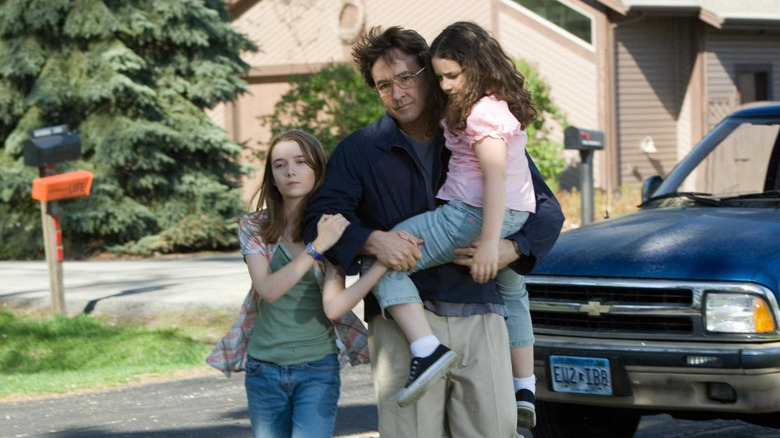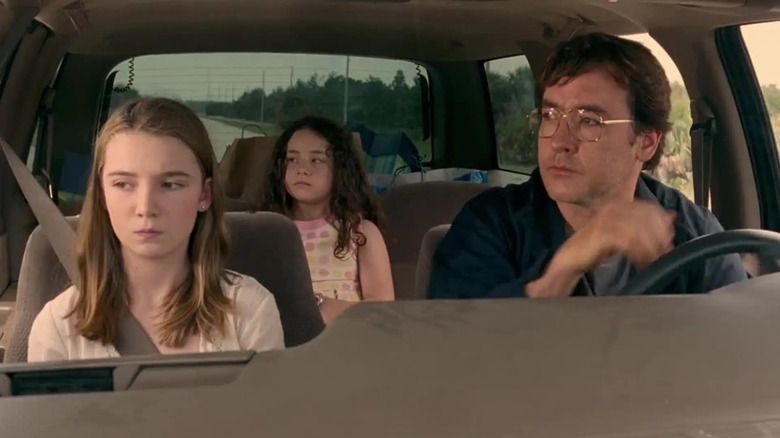Clint Eastwood Once Wrote The Music For A Military Movie That He Didn't Direct
James C. Strouse's 2007 military tragedy "Grace is Gone" is heartbreaking. It's about a United States Army veteran named Stanley Phillips (John Cusack) who adheres very stringently to a conservative politic when it comes to war. His wife, Grace (Dana Lynne Gilhooley), is currently deployed in Iraq during George W. Bush's prolonged War on Terror, and Stanley couldn't be more proud. He's a stern, but loving father to his daughters, the 12-year-old Heidi (Shélan O'Keefe) and the eight-year-old Dawn (Gracie Bednarczyk).
While his daughters are at school one afternoon, Stanley is informed that Grace has been killed in combat. He prepares to tell his daughters, but when they finally come home, he cannot bring himself to break the bad news. Because he is not emotionally equipped, his only way of coping is to bundle the kids into a car and have a spontaneous road trip. They will go have a vacation at a Floridian theme park they've always wanted to visit.
The rest of the film details Stanley's quiet realization of Grace's death and, by extension, the way wars can rip humans apart. Stanley encounters other family members on his road trip, and they know about Grace's death. He bristles at them. He is sad and angry, and insists on keeping the tragedy a secret from his daughters for as long as possible. Stanley can see their last moments of innocence at play. The film will inevitably climax with Stanley telling his daughters that their mother has died.
The film originally had a score by Max Richter, a prolific musician who would go on to score the film "Waltz With Bashir." According to the Los Angeles Times, Clint Eastwood saw an early screening of "Grace is Gone" and offered to re-do the score himself. Eastwood, after all, had been composing music for years, and was a lover of the blues. Strouse took up his offer.
Grace is Gone will break your heart
Knowing Cusack's open left-wing politics, one can see "Grace is Gone" as a rebuke of the war-happy George W. Bush administration; there was nothing heroic about what was happening in Iraq. Cusack confirmed this interpretation in a 2007 interview with The Hollywood Reporter, wherein he said he wanted to make an antiwar film after the Bush II administration had banned images of soldiers' coffins in newspapers. "Grace is Gone" is about the actual human consequences of war. (Cusack complimented Harvey Weinstein effusively in that interview as well, but it's important to remember that Weinstein wouldn't be arrested for being a serial sexual criminal for another decade.)
"Grace is Gone" debuted at the 2007 Sundance Film Festival, having been made for only $3 million. It was seen as such a hot commodity that the Weinstein Company shelled out $4 million for the distribution rights. Eastwood saw the film, perhaps at Sundance, and wanted to write some new music for it. Eastwood hasn't gone on record, sadly, as to why he felt the film needed a new score, or why he wanted to re-score the film himself. It's likely he had no objections to Max Richter's music and was simply moved by the film's drama, feeling that he could deepen it with his trademark gentle guitars.
Eastwood, in terms of his politics, stood opposite John Cusack at the time, leaning far more toward conservative ideas. It seems that he was so impressed with Strouse's film, however, that he put his politics aside and made the film that much richer and deeper. Or it's also possible that he, like many critics, saw "Grace is Gone" as apolitical, and merely told the tale of a sad man's grappling with grief.
"Grace is Gone" wasn't a big box office hit, making only about $1 million in the country's indie theaters, but it was nominated for two Golden Globe Awards ... both of them for Eastwood. He was nominated for Best Score, and for co-writing the song that played over the film's credits.

